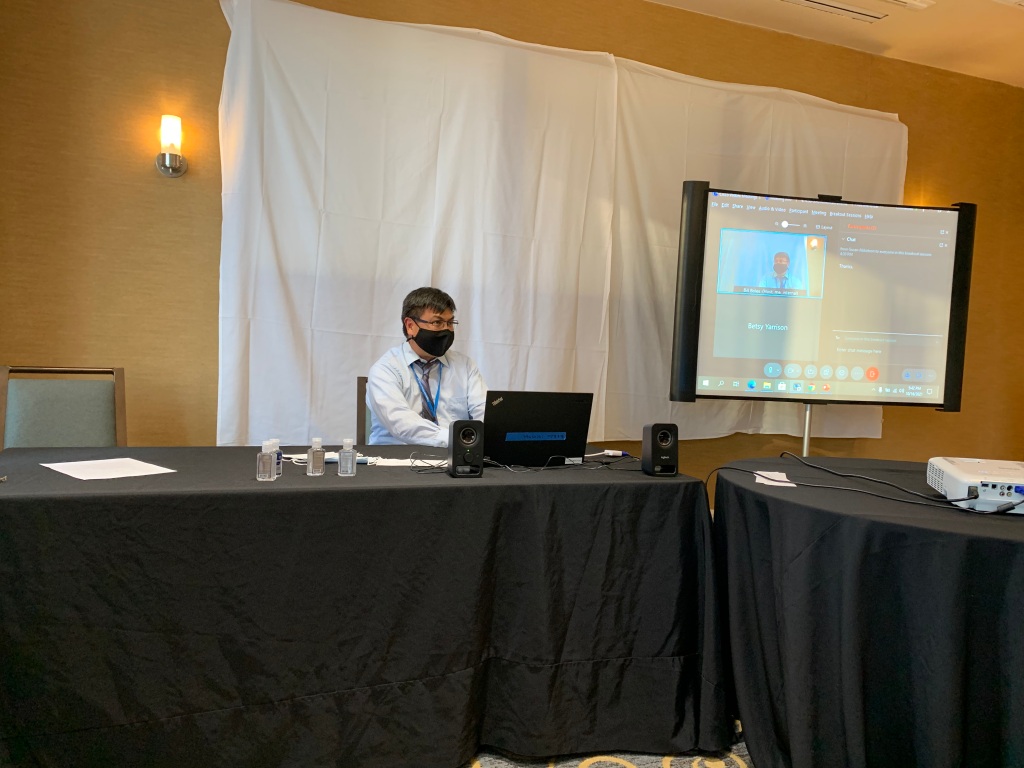Conferencing in the Age of Covid
October 28, 2021 / Dan Bacalzo, Ph.D. / Tags: NYU A/P/A Program and Institute, David Henry Hwang, Qui Nguyen, Conference, Comparative Drama
 Presenting at the 2021 Comparative Drama Conference
Presenting at the 2021 Comparative Drama Conference
For those of us in Academia, one of the more significant impacts of the Covid-19 pandemic has been the way we participate in academic conferences and other gatherings. Last year, I appeared as a virtual Zoom panelist at a conference. But while it was convenient, I’ll admit I felt disconnected from the conference proceedings, which usually have a more “event”-like feel. People travel to get there, and then once there, they get to interact with each other in ways they might not virtually.
Earlier this month, I made my first in-person conference appearance since the onset of the pandemic. And it was only because it was held in Florida, a few hours from where I live and work. I wasn’t about to fly, as I’m still a bit distrustful of airline Covid precautions (or really, the people who are flying in airplanes right now), as well as cautious about airline travel with recent reports of staff shortages and canceled flights.
The Comparative Drama Conference (CDC) was held in downtown Orlando, October 14-16, 2021. I presented a paper with the title, “Rap Battles with David Henry Hwang: Qui Nguyen’s Irreverent Homage to Asian America’s Best-Known Playwright.” It mostly concerns Nguyen’s play The Inexplicable Redemption of Agent G, and particularly how it features a fictionalized version of Hwang (and of Nguyen) within its structure.
I’ve presented on this play before, but had a new focus on the Hwang aspect, which I wanted to get some feedback on, and am hoping to do some revisions in the next few weeks before submitting the piece for publication. I am going to change the essay’s subheading before doing that, though, as I don’t think it really reflects what I’m trying to say in the paper, which is more about Qui Nguyen finding his voice as a playwright, as opposed to making it about an homage to Hwang.
My panel was in the last slot on Saturday, the final day of the conference. Usually, I worry about attendance at the end of a conference, but my panel had a decent-sized in-person audience, as well as a couple of virtual attendees who logged in to see the presentations. I think those of us who committed to coming to the conference in-person, also committed to sticking around. I saw a lot of the same faces at various conference panels and events (well, usually attendees were masked, so maybe I didn’t always see their faces).
CDC used a hybrid format with computers in each presentation room, and each in-person presenter had to stay in front of the computer screen to be seen by virtual attendees. I’m used to Zoom, and can get by on Microsoft Teams. CDC used WebEx, which I’m not as adept at, resulting in a few unfortunate technical delays (including not being able to figure out how to play a short video I wanted to show!)
Overall, the panel – which amazingly had a full slate of in-person presenters as opposed to every other panel I attended at the conference, which had at least one virtual presenter – was well-received, and followed by an engaged discussion. In short, it felt like a nice return to what I’ve enjoyed most about academic conferences, even if certain activities were curtailed.
But I don’t want to give the impression that in-person is the only format that works. One of the benefits of the increased awareness of virtual conferencing applications is that there are gatherings that I can attend now that would likely have been restricted to in-person attendees just a couple of years ago.
One of these was the 25th-anniversary celebration of the Asian/Pacific/American Studies Program and Institute at New York University, which held an online webinar on October 26 via Zoom. Individuals crucial to the founding of the program (many of whom were undergraduate students at the time) reunited in a fascinating recalling of a history that I was only partially aware of. At the time of A/P/A’s founding, I was a graduate student in Performance Studies at NYU. And while I presented at one of A/P/A’s first major initiatives – an “Asians in America” conference in 1996 – I actually did not realize at the time how hard-fought the battle was to get to that point.
One of the benefits of the increased awareness of virtual conferencing applications is that there are gatherings that I can attend now that would likely have been restricted to in-person attendees just a couple of years ago.
My association with A/P/A really didn’t start until a few years afterwards, when I was an ABD student (that’s “All But Dissertation” for those of you who might not get the lingo), and adjunct teaching in the Theatre Program at NYU. I was able to offer an Asian American Theatre course, which got cross-listed between Theatre and A/P/A, and one semester, even got to teach a cross-listed special topics course on playwrights David Henry Hwang and Philip Kan Gotanda.
Attending the webinar brought all that back, along with seeing some familiar names as both video participants and in the chat that ran parallel to the more formal proceedings. And that’s something else I’ve gotten to appreciate more of during virtual gatherings, as the chat serves as a nice outlet for attendees who aren’t formally presenting to make comments and feel more like participants in the event.
Share Post

